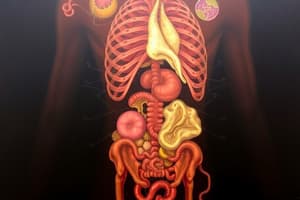Podcast
Questions and Answers
Which term describes the process of breaking down food into smaller molecules?
Which term describes the process of breaking down food into smaller molecules?
- Excretion
- Absorption
- Digestion (correct)
- Metabolism
What is the main function of the digestive system?
What is the main function of the digestive system?
- To eliminate waste products
- To break down food for absorption (correct)
- To produce new cells
- To regulate glucose in the body
What is the most basic unit of life?
What is the most basic unit of life?
- Molecules
- Atoms
- Tissues
- Cells (correct)
Which level of organization involves interaction between tissues and response to the environment?
Which level of organization involves interaction between tissues and response to the environment?
What is the main function of the circulatory system?
What is the main function of the circulatory system?
What is the primary function of the respiratory system?
What is the primary function of the respiratory system?
Which organ stores food, breaks it down mechanically and chemically, and empties partially broken down food into the small intestine?
Which organ stores food, breaks it down mechanically and chemically, and empties partially broken down food into the small intestine?
Where does most of the digestion of food components occur in the human body?
Where does most of the digestion of food components occur in the human body?
What is the main function of the large intestine?
What is the main function of the large intestine?
Which organ is the first stop for most absorbed nutrients?
Which organ is the first stop for most absorbed nutrients?
What is the main fuel for the human brain?
What is the main fuel for the human brain?
Which nutrient deficiency can increase the risk of infection and death?
Which nutrient deficiency can increase the risk of infection and death?
What is the leading cause of immune system deficiency worldwide?
What is the leading cause of immune system deficiency worldwide?
Which system regulates appetite, nutrient absorption, and storage?
Which system regulates appetite, nutrient absorption, and storage?
What happens to nutrient absorption when the digestive system is compromised?
What happens to nutrient absorption when the digestive system is compromised?
Flashcards are hidden until you start studying
Study Notes
Digestive System
- The process of breaking down food into smaller molecules is called digestion.
- The main function of the digestive system is to break down food into smaller molecules that can be absorbed and utilized by the body.
Organization Levels
- The most basic unit of life is the cell.
- The level of organization that involves interaction between tissues and response to the environment is the organ level.
Circulatory and Respiratory Systems
- The main function of the circulatory system is to transport oxygen and nutrients to cells and remove waste products.
- The primary function of the respiratory system is to bring oxygen into the body and remove carbon dioxide.
Digestion and Absorption
- The stomach stores food, breaks it down mechanically and chemically, and empties partially broken down food into the small intestine.
- Most of the digestion of food components occurs in the small intestine.
- The main function of the large intestine is to absorb water and electrolytes, and store and eliminate waste.
Nutrient Absorption and Immune System
- The liver is the first stop for most absorbed nutrients.
- The main fuel for the human brain is glucose.
- A deficiency in protein can increase the risk of infection and death.
- The leading cause of immune system deficiency worldwide is HIV/AIDS.
- The system that regulates appetite, nutrient absorption, and storage is the endocrine system.
- When the digestive system is compromised, nutrient absorption is impaired.
Studying That Suits You
Use AI to generate personalized quizzes and flashcards to suit your learning preferences.




